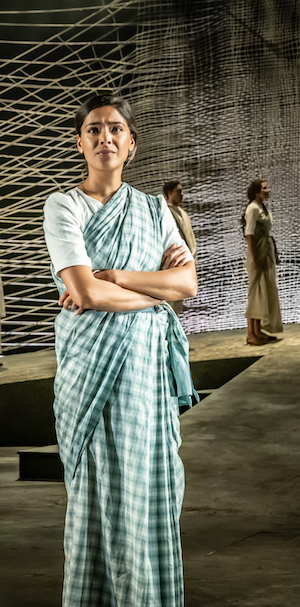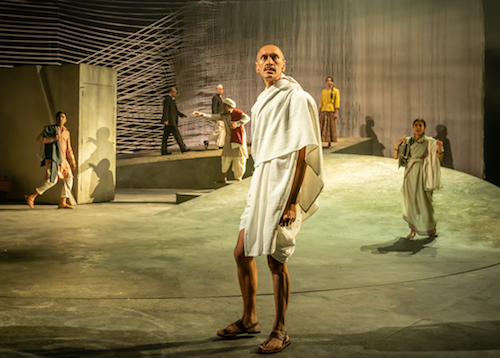The Father and the Assassin, National Theatre review - Gandhi's killer puts his case in a bold, whirlwind production | reviews, news & interviews
The Father and the Assassin, National Theatre review - Gandhi's killer puts his case in a bold, whirlwind production
The Father and the Assassin, National Theatre review - Gandhi's killer puts his case in a bold, whirlwind production
Anupama Chandrasekhar argues, with humour and invention, against political extremism

The young Indian man stepping towards us on the vast Olivier stage is unremarkable enough, slight and boyish in manner. When he speaks he is direct, even cheeky: he wants us to like him. But this is Nathuram Godse, Gandhi's blood-stained murderer. He surely has a tough task ahead if he is going to persuade his listeners that he had the least justification for brutally killing the father of his nation (Bapu to his followers), the universal byword for peaceful protest.
Chennai-based playwright Anupama Chandrasekhar is accustomed to tackling challenging subjects. She has previously collaborated with director Indhu Rubasingham three times before, at the Royal Court and at Rubasingham's own theatre, the Kiln, most recently in 2019 when she dealt with the infamous 2012 Delhi gang rape in When the Crows Visit.
While in London between 2016 and 2017, as the NT's first international writer in residence, she described her preoccupation with Godse to Rubasingham, at a time when – shockingly to many – the first statue to him was being erected in India. His extreme Hindu politics are again resonating in India, just as populism and nationalism are finding adherents in many other parts of the world. There is no direct reference to modern Indian politics (although there is a surprise joke about Brexit) but the parallels are there to be drawn.
 Chandrasekhar is clear that she is not interested in presenting "a history lesson". By telling her story through Godse (an engaging Shubham Saraf), about whom comparatively little is known, she has freed herself to mix known facts with imagination and political ideas. Nevertheless, there are times when this does feel like an excursion into history, leading to inevitable discussion in the interval about which bits are true. But in another sense this Godse is a construct, light-heartedly drawn with more than a dash of humour. Chandrasekhar offers, not an analysis of a historical person, but an agglomeration of a few facts with a suggestion of the ways in which political extremism can take hold. It is true that Godse was brought up as a girl (his parents believed that their sons, who died young, were cursed and his survival as a girl was more likely) and that he was revered as a seer when young, all of which may or may not have had an effect on his political choices. In any case, it seems clear that he could be influenced by stronger, more impressive personalities, or, more accurately, an idea of those personalities and what they stood for. He was a devoted follower of Gandhi himself until he met the right-wing nationalist, Vinayak Savarkar, who preached Hindutva (Hindu-ness) and then became just as fiercely anti- Gandhi's prescription for peaceful protest. The most extreme action may well be taken by someone who is simply naive.
Chandrasekhar is clear that she is not interested in presenting "a history lesson". By telling her story through Godse (an engaging Shubham Saraf), about whom comparatively little is known, she has freed herself to mix known facts with imagination and political ideas. Nevertheless, there are times when this does feel like an excursion into history, leading to inevitable discussion in the interval about which bits are true. But in another sense this Godse is a construct, light-heartedly drawn with more than a dash of humour. Chandrasekhar offers, not an analysis of a historical person, but an agglomeration of a few facts with a suggestion of the ways in which political extremism can take hold. It is true that Godse was brought up as a girl (his parents believed that their sons, who died young, were cursed and his survival as a girl was more likely) and that he was revered as a seer when young, all of which may or may not have had an effect on his political choices. In any case, it seems clear that he could be influenced by stronger, more impressive personalities, or, more accurately, an idea of those personalities and what they stood for. He was a devoted follower of Gandhi himself until he met the right-wing nationalist, Vinayak Savarkar, who preached Hindutva (Hindu-ness) and then became just as fiercely anti- Gandhi's prescription for peaceful protest. The most extreme action may well be taken by someone who is simply naive.
Saraf is onstage throughout. He carries the responsibility of holding this busy production together with easy confidence. It is his performance, under Indhu Rubasingham's sure direction, which sets the tone. The subject could scarcely be more serious – or more pertinent – given world politics, but solemnity is kept at bay and the audience, most of whom will have only a sketchy idea of the actual events, constantly acknowledged and deftly entertained. Emotion too is controlled; this is a play of ideas not feeling.

Paul Bazely (pictured immediately above) has the difficult task of becoming Gandhi, someone whose image and philosophy are, by contrast, widely known. He is of necessity here marginalised; Chandrasekhar is interested in Godse's idea of "Bapu", rather than the man himself. The "father" of the title has further resonances when, in the last moments, Godse targets Gandhi's failed relationship with his eldest son. The sad story of Harilal Gandhi has contributed to the chipping away in recent years of Bapu's saintly image. If Gandhi was a giant of 20th century history and Godse sadly misled, both were human, neither without complication.
A cast of 19 become crowds of followers at an ashram, protesters at the salt marches or refugees during Partition in some excellent ensemble playing. Notable among them are Ankar Bahl who plays both a teasing childhood friend and Godse's employer and Dinita Gohil (pictured above left) who reappears throughout Godse's life even when he announces that "she is of no importance narratively speaking".
Rajha Shakiry's simple, sweeping set is backed by a suggestion of woven cloth-in-the-making, cleverly drawing together Gandhi's predilection for spinning, Godse's employment as a tailor and the difficult genesis of two new, post-colonial nations. It is a fitting setting for colourful, ambitious, fast-paced storytelling.
rating
Explore topics
Share this article
The future of Arts Journalism
You can stop theartsdesk.com closing!
We urgently need financing to survive. Our fundraising drive has thus far raised £49,000 but we need to reach £100,000 or we will be forced to close. Please contribute here: https://gofund.me/c3f6033d
And if you can forward this information to anyone who might assist, we’d be grateful.

Subscribe to theartsdesk.com
Thank you for continuing to read our work on theartsdesk.com. For unlimited access to every article in its entirety, including our archive of more than 15,000 pieces, we're asking for £5 per month or £40 per year. We feel it's a very good deal, and hope you do too.
To take a subscription now simply click here.
And if you're looking for that extra gift for a friend or family member, why not treat them to a theartsdesk.com gift subscription?
more Theatre
 The Maids, Donmar Warehouse review - vibrant cast lost in a spectacular-looking fever dream
Kip Williams revises Genet, with little gained in the update except eye-popping visuals
The Maids, Donmar Warehouse review - vibrant cast lost in a spectacular-looking fever dream
Kip Williams revises Genet, with little gained in the update except eye-popping visuals
 Ragdoll, Jermyn Street Theatre review - compelling and emotionally truthful
Katherine Moar returns with a Patty Hearst-inspired follow up to her debut hit 'Farm Hall'
Ragdoll, Jermyn Street Theatre review - compelling and emotionally truthful
Katherine Moar returns with a Patty Hearst-inspired follow up to her debut hit 'Farm Hall'
 Troilus and Cressida, Globe Theatre review - a 'problem play' with added problems
Raucous and carnivalesque, but also ugly and incomprehensible
Troilus and Cressida, Globe Theatre review - a 'problem play' with added problems
Raucous and carnivalesque, but also ugly and incomprehensible
 Clarkston, Trafalgar Theatre review - two lads on a road to nowhere
Netflix star, Joe Locke, is the selling point of a production that needs one
Clarkston, Trafalgar Theatre review - two lads on a road to nowhere
Netflix star, Joe Locke, is the selling point of a production that needs one
 Ghost Stories, Peacock Theatre review - spirited staging but short on scares
Impressive spectacle saves an ageing show in an unsuitable venue
Ghost Stories, Peacock Theatre review - spirited staging but short on scares
Impressive spectacle saves an ageing show in an unsuitable venue
 Hamlet, National Theatre review - turning tragedy to comedy is no joke
Hiran Abeyeskera’s childlike prince falls flat in a mixed production
Hamlet, National Theatre review - turning tragedy to comedy is no joke
Hiran Abeyeskera’s childlike prince falls flat in a mixed production
 Rohtko, Barbican review - postmodern meditation on fake and authentic art is less than the sum of its parts
Łukasz Twarkowski's production dazzles without illuminating
Rohtko, Barbican review - postmodern meditation on fake and authentic art is less than the sum of its parts
Łukasz Twarkowski's production dazzles without illuminating
 Lee, Park Theatre review - Lee Krasner looks back on her life as an artist
Informative and interesting, the play's format limits its potential
Lee, Park Theatre review - Lee Krasner looks back on her life as an artist
Informative and interesting, the play's format limits its potential
 Measure for Measure, RSC, Stratford review - 'problem play' has no problem with relevance
Shakespeare, in this adaptation, is at his most perceptive
Measure for Measure, RSC, Stratford review - 'problem play' has no problem with relevance
Shakespeare, in this adaptation, is at his most perceptive
 The Importance of Being Earnest, Noël Coward Theatre review - dazzling and delightful queer fest
West End transfer of National Theatre hit stars Stephen Fry and Olly Alexander
The Importance of Being Earnest, Noël Coward Theatre review - dazzling and delightful queer fest
West End transfer of National Theatre hit stars Stephen Fry and Olly Alexander
 Get Down Tonight, Charing Cross Theatre review - glitz and hits from the 70s
If you love the songs of KC and the Sunshine Band, Please Do Go!
Get Down Tonight, Charing Cross Theatre review - glitz and hits from the 70s
If you love the songs of KC and the Sunshine Band, Please Do Go!
 Punch, Apollo Theatre review - powerful play about the strength of redemption
James Graham's play transfixes the audience at every stage
Punch, Apollo Theatre review - powerful play about the strength of redemption
James Graham's play transfixes the audience at every stage

Add comment